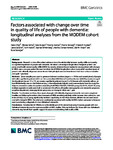Factors associated with change over time in quality of life of people with dementia: longitudinal analyses from the MODEM cohort study
| dc.contributor.author | King, D | |
| dc.contributor.author | Farina, Nicolas | |
| dc.contributor.author | Burgon, C | |
| dc.contributor.author | Feeney, Y | |
| dc.contributor.author | Berwald, S | |
| dc.contributor.author | Bustard, E | |
| dc.contributor.author | Gallaher, L | |
| dc.contributor.author | Habibi, R | |
| dc.contributor.author | Wittenberg, R | |
| dc.contributor.author | Comas-Herrera, A | |
| dc.contributor.author | Knapp, M | |
| dc.contributor.author | Banerjee, Sube | |
| dc.date.accessioned | 2022-07-01T15:49:39Z | |
| dc.date.issued | 2022-05-31 | |
| dc.identifier.issn | 1471-2318 | |
| dc.identifier.issn | 1471-2318 | |
| dc.identifier.other | 469 | |
| dc.identifier.uri | http://hdl.handle.net/10026.1/19386 | |
| dc.description.abstract |
<jats:title>Abstract</jats:title><jats:sec> <jats:title>Background</jats:title> <jats:p>Research to date offers mixed evidence about the relationship between quality of life and severity of cognitive impairment in people with dementia. We aimed to investigate longitudinal changes in patient- and proxy-rated health-related quality of life (HRQL) by severity of dementia and explore factors associated with changes in HRQL over a one-year period. We used data from the MODEM longitudinal cohort study which recruited dyads of persons with clinically diagnosed dementia and their principal carer and interviewed them face-to-face at baseline and again 1 year later.</jats:p> </jats:sec><jats:sec> <jats:title>Methods</jats:title> <jats:p>Quota sampling was used to generate balanced numbers (target <jats:italic>n</jats:italic> = 100 for each severity level) of people with mild cognitive impairment (20+ on the standardised Mini-Mental State Examination (sMMSE)), moderate cognitive impairment (score 10 to 19), and severe cognitive impairment (score 0 to 9). Persons with dementia without an identifiable family carer or other informant (e.g., a formal/professional/paid carer) were excluded from the study. Participants answered a series of questions measuring their HRQL: DEMQOL, DEMQOL-proxy, EQ-5D-3 L, EQ-5D-3L proxy. Multiple regression models were built to understand the effects of baseline demographics and dementia symptoms (cognitive impairment, neuropsychiatric symptoms) on change in HRQL over 1 year.</jats:p> </jats:sec><jats:sec> <jats:title>Results</jats:title> <jats:p>Two hundred and forty-three dyads of people with clinically diagnosed dementia and carers completed baseline and follow-up interviews. Most measures of HRQL remaining relatively stable between time-points, but one index of HRQL, EQ-5D proxy, significantly declined. Depending on the HRQL measure, different factors were associated with change in HRQL. The only factor consistently associated with decline in HRQL (when compared to improvement) was having a diagnosis of a non-Alzheimer’s dementia.</jats:p> </jats:sec><jats:sec> <jats:title>Conclusions</jats:title> <jats:p>Deterioration in HRQL is not an inevitable part of the dementia journey. However, people with non-Alzheimer’s dementias may be more susceptible to HRQL decline. This may indicate that those with non-Alzheimer’s dementia may benefit from specific support focussed on maintaining their quality of life.</jats:p> </jats:sec> | |
| dc.format.extent | 469- | |
| dc.format.medium | Electronic | |
| dc.language | en | |
| dc.language.iso | eng | |
| dc.publisher | BioMed Central | |
| dc.subject | Quality of life | |
| dc.subject | Dementia | |
| dc.subject | Alzheimer's disease | |
| dc.subject | Wellbeing | |
| dc.subject | Health | |
| dc.subject | Cognitive impairment | |
| dc.subject | Caregiver | |
| dc.subject | Longitudinal studies | |
| dc.title | Factors associated with change over time in quality of life of people with dementia: longitudinal analyses from the MODEM cohort study | |
| dc.type | journal-article | |
| dc.type | Journal Article | |
| dc.type | Research Support, Non-U.S. Gov't | |
| plymouth.author-url | https://www.webofscience.com/api/gateway?GWVersion=2&SrcApp=PARTNER_APP&SrcAuth=LinksAMR&KeyUT=WOS:000803887500003&DestLinkType=FullRecord&DestApp=ALL_WOS&UsrCustomerID=11bb513d99f797142bcfeffcc58ea008 | |
| plymouth.issue | 1 | |
| plymouth.volume | 22 | |
| plymouth.publication-status | Published | |
| plymouth.journal | BMC Geriatrics | |
| dc.identifier.doi | 10.1186/s12877-022-03142-z | |
| plymouth.organisational-group | /Plymouth | |
| plymouth.organisational-group | /Plymouth/Faculty of Health | |
| plymouth.organisational-group | /Plymouth/Faculty of Health/Peninsula Medical School | |
| plymouth.organisational-group | /Plymouth/Faculty of Health/Peninsula Medical School/PMS - Manual | |
| plymouth.organisational-group | /Plymouth/REF 2021 Researchers by UoA | |
| plymouth.organisational-group | /Plymouth/REF 2021 Researchers by UoA/UoA03 Allied Health Professions, Dentistry, Nursing and Pharmacy | |
| plymouth.organisational-group | /Plymouth/Users by role | |
| plymouth.organisational-group | /Plymouth/Users by role/Academics | |
| plymouth.organisational-group | /Plymouth/Users by role/Researchers in ResearchFish submission | |
| dc.publisher.place | England | |
| dcterms.dateAccepted | 2022-03-14 | |
| dc.rights.embargodate | 2022-7-2 | |
| dc.identifier.eissn | 1471-2318 | |
| dc.rights.embargoperiod | Not known | |
| rioxxterms.funder | Economic and Social Research Council | |
| rioxxterms.identifier.project | Comprehensive approach to modelling outcome and cost impacts of interventions for dementia | |
| rioxxterms.versionofrecord | 10.1186/s12877-022-03142-z | |
| rioxxterms.licenseref.uri | http://www.rioxx.net/licenses/all-rights-reserved | |
| rioxxterms.licenseref.startdate | 2022-05-31 | |
| rioxxterms.type | Journal Article/Review | |
| plymouth.funder | Comprehensive approach to modelling outcome and cost impacts of interventions for dementia::Economic and Social Research Council |


